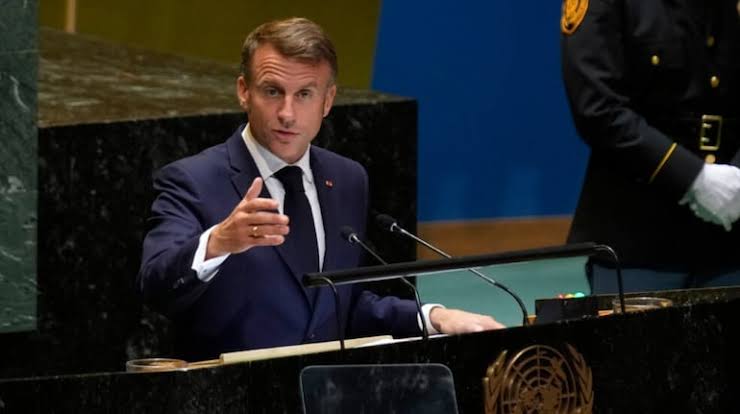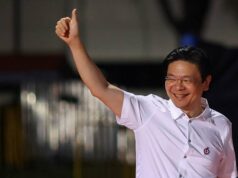Macron calls for EU self-reliance

Anita Mathur
French President Emmanuel Macron has described Donald Trump’s return to the White House as an “electroshock” for Europe, urging the European Union to assume greater responsibility for its security and economic future.
In a recent interview with the Financial Times, Macron emphasized that the EU must embrace a “strategic wake-up” and reduce its dependence on the United States, China, and Russia.Macron’s remarks follow Trump’s phone conversation with Russian President Vladimir Putin, where both leaders agreed to initiate negotiations aimed at resolving the conflict in Ukraine.
The conversation, which lasted nearly 90 minutes, was the first known direct interaction between the two leaders since hostilities escalated in 2022.
For Macron, Trump’s foreign policy signals a profound shift in the global order, necessitating a fundamental reassessment of Europe’s strategic dependencies.
The French leader highlighted the EU’s historical reliance on Chinese markets for exports, American military protection, and Russian energy for industrial production-an arrangement he declared no longer viable.
According to Macron, the EU must adapt to this changing landscape by strengthening its defense capabilities and reinvigorating its economy.
A key point in Macron’s strategy involves reducing reliance on American-made weapons and investing in European alternatives. Specifically, he urged EU member states to adopt the Franco-Italian SAMP-T air defense system instead of the widely used US-made Patriot system.
Macron’s push for an independent European military capability aligns with his long-standing vision of European “strategic autonomy,” a concept he has championed since his first term as president.
While Macron’s call for defense self-sufficiency is not new, the urgency of his message reflects Europe’s growing uncertainty regarding Trump’s policies.
The former and now current US president has repeatedly questioned NATO’s relevance, suggesting that Washington may not come to the defense of allies who fail to meet their financial commitments to the alliance.
Such statements have fueled concerns in European capitals about the reliability of US security guarantees, prompting leaders like Macron to advocate for a more self-sufficient Europe.
Trump’s decision to engage directly with Putin on Ukraine has stirred mixed reactions in Europe. Some EU leaders expressed frustration over what they see as Washington’s unilateral diplomacy, particularly given Trump’s history of skepticism toward NATO and European alliances.
Critics argue that Trump’s approach to negotiations risks making premature concessions to Russia, undermining Ukraine’s position.
However, Macron sees an opportunity in Trump’s engagement with Moscow. He acknowledged that the new US administration had created a diplomatic opening for a settlement in Ukraine, but emphasized that any negotiations must prioritize Ukrainian sovereignty.
“Only Ukraine’s President Zelensky has the authority to negotiate with Russia to end the conflict,” Macron stated, warning that a peace agreement amounting to Ukrainian capitulation would be “bad news for everyone.”
His remarks suggest a delicate balancing act-acknowledging Trump’s role in creating diplomatic momentum while insisting that Europe must play a central role in shaping the outcome.
In contrast to some EU leaders’ outright scepticism toward Trump, Macron appears to be positioning himself as a pragmatic intermediary who can leverage the new geopolitical reality to Europe’s advantage.
Beyond defense, Macron’s vision extends to economic resilience. He emphasized that the EU must “muscle up” its economy and reduce reliance on external actors.
This includes diversifying trade partnerships, increasing industrial competitiveness, and investing in strategic sectors such as energy, technology, and infrastructure.
The shift is particularly crucial in light of China’s growing influence and the EU’s recognition of the risks associated with economic overdependence on Beijing.
Trump’s return has also reignited debates over transatlantic trade. His administration has historically imposed tariffs on European goods and expressed dissatisfaction with existing trade agreements.
If such protectionist measures return, they could further strain US-EU relations, reinforcing Macron’s argument for European economic self-reliance.
Macron’s call for strategic autonomy also raises broader questions about the future of NATO. While the alliance remains the cornerstone of European security, Trump’s previous criticism of NATO and his transactional approach to alliances have made European leaders wary.
Macron has long advocated for a European defense initiative that operates alongside NATO but provides the EU with greater security independence.
The upcoming high-level meeting at the Munich Security Conference, where American and Russian representatives are set to discuss the Ukraine conflict, will be a critical moment for European diplomacy.
Macron has signaled that the EU must assert its role in these negotiations rather than remain a passive observer of US-Russia dialogue.
The challenge will be whether Europe can present a unified position amid internal divisions over how to handle relations with both Moscow and Washington.
Despite Macron’s push for self-reliance, the EU remains divided on the best course of action. Some member states, particularly those in Eastern Europe, still view the US as the ultimate security guarantor and remain skeptical of Macron’s vision.
Poland and the Baltic states, for example, have consistently advocated for stronger US military presence in the region, fearing that European-led security initiatives would be inadequate in deterring Russian aggression.
Germany, traditionally cautious in military matters, has shown some willingness to increase defense spending but remains hesitant about fully endorsing Macron’s strategic autonomy agenda.
Meanwhile, other countries like Italy and Spain have adopted a more measured approach, supporting greater EU coordination while maintaining strong ties with Washington.
Trump’s return has undoubtedly jolted Europe into a period of strategic reassessment. Macron’s response-framing it as an “electroshock” necessary for European awakening-reflects his belief that the EU must take control of its own destiny.
However, achieving true strategic autonomy will require overcoming significant political and economic challenges, as well as navigating intra-European disagreements.
As the Munich Security Conference approaches and US-Russia talks progress, Europe faces a critical juncture. Whether Macron’s vision of a stronger, more independent Europe gains traction will depend on how effectively the EU can unify behind a coherent strategy.
Trump’s diplomacy may have disrupted old alliances, but for Macron, it presents an opportunity-one that Europe cannot afford to ignore.




